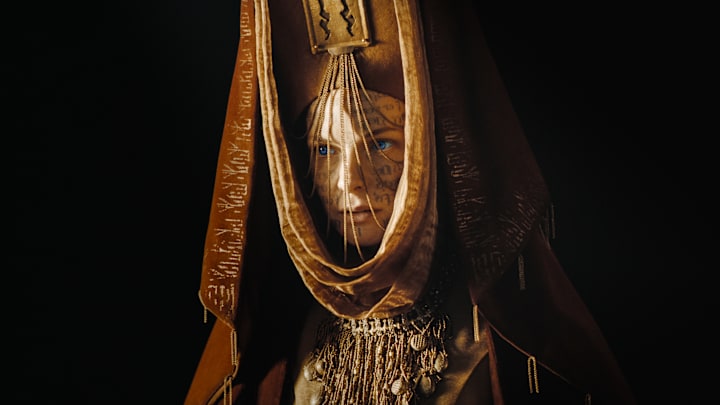Dune: Part Two has been out for a couple weeks now, long enough that I'm comfortable writing about some SPOILERS. One of the strangest aspects of the movie involves the character of Alia, the little sister of Paul Atreides. Paul's mother Lady Jessica becomes pregnant with Alia before the end of the first movie, and remains pregnant for the entirety of Part Two. After Jessica ingests the Water of Life in a ritual to become a Reverend Mother among the Fremen people of Arrakis, something strange happens: the unborn Alia achieves consciousness in the womb, and talks to her mom throughout the rest of the movie, voiced by Anya Taylor-Joy. Taylor-Joy shows up as a grown-up Alia for a brief moment in one of Paul's prescient visions, but won't have a proper role to play until Dune: Part Three, which will adapt the book Dune Messiah.
Alia's story goes down differently in Frank Herbert's book Dune, originally published in 1965. You can decide for yourself if it's more or less weird: in the book, after Jessica drinks the Water of Life, the story skips forward several years. Alia is born in the interim, and she is a creepy child with the mind of an adult, looked over by a Fremen woman named Harah. She plays a pretty big role, even killing the Baron Vladimir Harkonnen in the climax of the story, a job given to Paul in the movie.
Why did Dune director Denis Villeneuve change Alia's story for the movie? Dune: Part Two co-writer Jon Spaihts explained everything to Mashable. To start, they didn't want to include that time jump, since it would have reduced some of the urgency of the story. "That long interval has a cooling effect," Spaihts said. "If Duke Leto died years ago, how much are Jessica and Paul feeling that death? They will have metabolized it to a certain extent. If the Baron launched his push against the Atreides on Arrakis with the Emperor's help years ago, it's beginning to be eclipsed by other news...[A shorter time jump] lets everyone get set up in new positions and meet on new ground, but all of their wounds are still fresh."
I don't necessarily agree with this, by the way. It's okay for revenge to be served cold, and giving Paul more time in the desert with the Fremen would have made his transformation from rich kid to messiah more believable. But I don't think it's a terrible choice, either. This wasn't the only change to the source material that the movie made. It happens.
Watch a deleted scene featuring young Alia from David Lynch's 1984 Dune movie
The other reasons Spaihts gave for changing Alia's story is that they didn't want it to come across as cringey or silly. "These days, digital tools exist to allow you to map an actor's performance on anything, even a talking banana," he said. "So you could definitely make a toddler-looking entity talk with an adult voice. But I think that's still fraught with peril. You could find yourself creating something that was unintentionally funny or off-putting."
Again, I don't necessarily truck with this reasoning. If you do it right, I think a toddler with the mind of an adult could have been very creepy, which is the intent from the book where Alia freaks out everyone around her. David Lynch featured baby Alia in his 1984 movie version of Dune. A deleted scene featuring child actor Alicia Witt playing Alia surfaced just recently, introduced by actor Molly Wryn, who played Harah:
Finally, Spaihts says that he thinks introducing a character like Alia late in the game would have been a distraction. "It would pull focus from what I think the real headline drama is, which is the interplay between the adult characters that we've been watching now for two epic films."
Ultimately, I don't care too much that the movie altered things, although I suspect the filmmakers could have included a book-accurate version of Alia if they wanted to. But the creepy talking fetus was strange and interesting in its own way. "Suddenly, [Alia speaking to Jessica in utero] gives you a Jessica who's talking to a ghost that no one else can see. She's talking to a being who isn't there, and it makes her look a little mad," Spaihts said. "We love that as an evolution of Jessica's character, because it dramatizes the madness of giving herself over to this ancient Bene Gesserit program and to its prophecies and to the project of manipulating entire societies."
"Denis became very interested, as the extraordinary visualist he is, in that representation of the fetus Alia before her birth. The notion of sunlight penetrating the wall of Jessica's womb as she walks through a sunbeam and casting a red light on Alia was one of the earliest images that Denis got excited about."
Again, if Villeneuve and company end up making Dune: Part Three, as Villeneuve has said he wants to do, we'll get to see what Alia's like when she's walking and talking. Until then, Dune: Part Two is playing now in movie theaters.
To stay up to date on everything fantasy, science fiction, and WiC, follow our all-encompassing Facebook page and sign up for our exclusive newsletter.
Get HBO, Starz, Showtime and MORE for FREE with a no-risk, 7-day free trial of Amazon Channels
